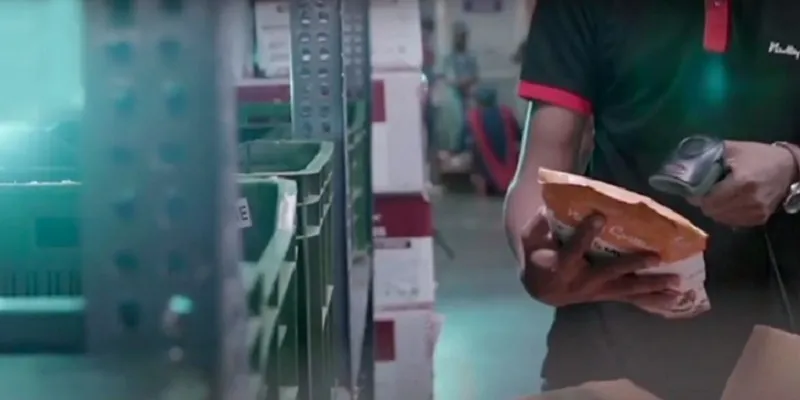Starting from the streets of Delhi to now selling pan-India: how Dinika Bhatia built Nutty Gritties
Nutty Gritties, Delhi-based D2C nuts and dry fruits brand, offers 30 healthy snacks in unique flavours. It sells on Amazon, Bigbasket, and Flipkart, and has a strong presence in physical stores across 27 cities.
Once an economic, political, and cultural hub of Central Asia, the Silk Road saw the trading of silk textiles, dry fruits and nuts, saffron, and glass bottles, among others in abundance.
From these narratives rose a legacy family business in 1887 that solely traded nuts and spices. At present, the 130-year-old company has branched out as a direct-to-consumer (D2C) brand called Nutty Gritties, which has a retail presence in over 13 cities.
In an interaction with SMBStory, Dinika Bhatia, the 33-year-old founder of Nutty Gritties, says,
"Belonging to a family that has been in the nuts and dry fruit trade since 1887, I grew up constantly surrounded by conversations around dry fruits and nuts. At the age of 13, I knew this is what I was destined to do. I moved to California to attend college in 2005, and spent my summers visiting the almond orchards and processing units to enhance my knowledge of the trade."
California accounts for over 80 percent of the world’s almond production, and Dinika couldn’t have been better placed to learn about the nuts business. In her final year of college, in 2009, she wrote a business plan that not only cemented her degree but also served as the blueprint for the foundation of Nutty Gritties.
"In the US, nuts were such a versatile and healthy snack, and I always wondered why back in India, we are only stuck to eating nuts around winter, Diwali, and weddings. I moved back to India in June 2009, we incorporated in August, and launched Nutty Gritties brand under the company DRB Foods in September," she adds.
Dinika's family business, California Agri Nuts Corporation, is run by her father Raju Bhatia, who also helped her with an early capital of Rs 50 lakh to build the brand.
"We are completely bootstrapped. Although, I acknowledge that my father was my angel investor, and we’ve treated that capital the same way you would to an outside investor, to maximise the value of their shareholding," Dinika says.

Dinika Bhatia, founder of Nutty Gritties
The brand
From being a commodity, a status symbol, to becoming an important part of prayer and celebration, the rich value of dry fruits and nuts have remained constant.
According to Statista, the market size of the dry fruits and nuts segment is $4.3 billion annually in India. Of this, 95 percent comes from the unorganised segment, dominated by seasoned traders.
In fact, the consumption of dry fruits in India has been growing at 10-12 percent per year, indicating the rise in both metros and smaller cities, as well as how the consumption pattern is moving from traditional to healthy snacking.
From setting up a factory in Okhla, Delhi, to meeting retailers and consumers to convince them about the packaged, organic, and curated nuts and spices, Dinika had to do it all by herself.
"Nutty Gritties was started with the mission to make dry fruits keep up with evolving palates of today’s customer. Traditionally, dry fruits in India has been a wholesale commodity business. We wanted to modernise the traditional nut and give it a new function and form through innovative flavours and mixes. We have flavours such as Barbeque Almonds, Thai Chilli blend, Pepper Cashews, multiple mixes in nuts, berries, and seeds, etc. We are solving the basic problem of a lack of healthy snacking option that tastes great," Dinika says.
The brand sources its raw materials from California Agri Nuts Corporation, which sources from the US, as well as local Indian farmers. It efficiently sorts, grades, roasts, flavours, and packages them before they reach customers.
In 2009, Dinika first started selling in a retail shop called Modern Bazaar, which at the time, had a single store in Vasant Vihar, New Delhi. The following year, she secured Walmart and Barista as its clients and began exploring distribution across India.
By the age of 22, Dinika could confidently walk into corporate offices of retail chains in India and sell the brand. Eventually, she secured large retailers like More and the Future Group. In 2015, the brand adopted the D2C model and launched its website, and also started selling on ecommerce sites.
In FY20, Nutty Gritties reported an annual turnover of Rs 20 crore, of which 25 percent of the revenue was received from ecommerce channels like Amazon and its website. The company has been consistently profitable for the last five years. It competes with Happilo, Cornitos, and Rostaa.
The hardships over the decade
With a lot of the raw material being imported, the brand faces constant price volatility due to changing currency. Over the years, it has been able to use hedge mechanisms to protect itself against currency risks.
Another battle the brand constantly fights is with changing the commodity mindset associated with dry fruits. Hence, it keeps competing with brands where the only differentiator is just price and not the quality of the nuts.
"Seven-eight years ago, the story was very different. I think a big challenge is making dry fruits and nuts more accessible to the common man. We want to build an approachable and inclusive brand, and we are constantly learning to get better at that," says Dinika.
The company has now built trust with its customers both online and offline. Dinika believes for a product to succeed, an entrepreneur must own the entire stack and be a stickler to quality, and simultaneously, scale by understanding markets and channels.
The brand sells across modern retail chains like Nature’s Basket, Food Hall, TwentyFour Seven, Namdhari’s; and cash and carry stores like Metro and Walmart. It is present in over 2,000 premium retail stores across India, as well as sells on Amazon, Flipkart, Bigbasket, and several airlines in India.
Nutty Gritties also has a strategic relationship with Amazon and is part of its Launchpad programme. The brand supplies on-the-go snacking, single-serves to vending machines, and also supplies to corporates for their festive snacking needs. It also has an offering for corporate and wedding gifting as well.
The next steps
Over the last decade, Nutty Gritties has created 30 products in unique flavours, ranging from Wasabi Cashews, Coffee Almonds, to Cinnamon Apple mix. It now plans on launching new products every three months.
"We’ve seen an acceleration and a positive uptick in sales during the lockdown. We saw 5X growth in ecommerce demand which has stabilised even after the unlock measures. We also learned to work more efficiently across all functions because of limited availability of resources, realising the “do more with less” attitude really helped us service the surge in demand," she says.
Dinika believes her legacy has given her an impetus to build a digital and physical company in 10 years.

Nutty Gritties warehouse
"The most difficult time is now because there is so much to do —so many opportunities around consumption in the country, which means, more products to create, more geographies to cover, and building that team and infrastructure that is going to allow me to follow my mission of building a billion-dollar company, promoting better health, and spreading love across the world.
“We’re focused on building a Rs 100 cr brand in the next few years by expanding our footprint to emerging corners of India. We’ve used retail stores as a new customer acquisition platform and online as a customer retention platform. That is how we view the digital-first consumer," Dinika says.
Edited by Suman Singh









